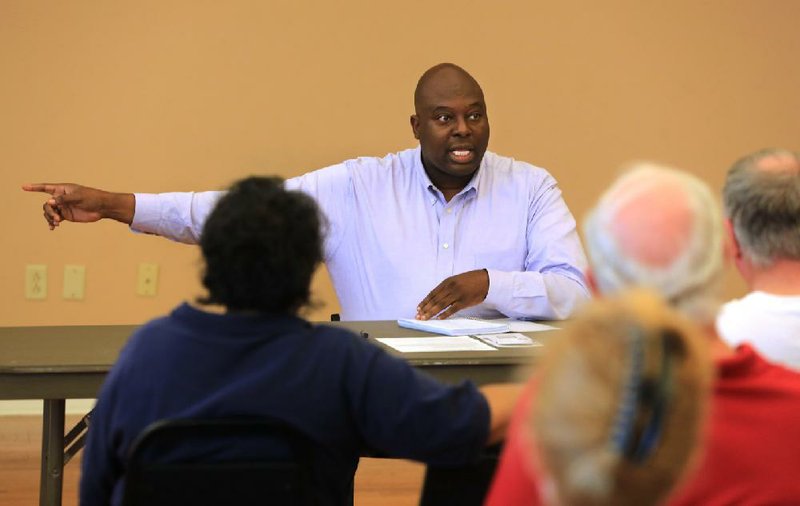His name is Kenton Buckner.
He's the new Little Rock chief of police and he's still getting oriented.
But he's not afraid to talk straight.
The Kentucky native and former assistant chief in Louisville says these things as he has set off on a whirlwind of meetings, forums, and strategy sessions and briefings at every tier of his department since replacing Stuart Thomas on June 30 as head of the state's largest Police Department.
Buckner, 45, won the job over 58 other applicants, including three veteran Little Rock commanders, in part for his expressed commitment to strengthening the bonds between the department and the public that the department protects.
Saturday morning, Buckner was a guest of the Coalition of Greater Little Rock Neighborhoods at the Willie L. Hinton Neighborhood Resource Center, where he laid out his priorities. Chief among them is increasing community engagement, and a sense of shared responsibility, in combating the city's crime.
Buckner said that the concept has become a "buzzword," something thrown around and seldom followed. On Saturday, he committed to more police involvement not only at public gatherings but also more community-oriented police officers working in the neighborhoods.
But his department, no matter how engaged, can't make it work alone, and he challenged those in attendance to do more than complain. He called on them to organize, to lobby and to work with his department.
"We've already met our quota for 'experts'... rock throwers, we're good on it," Buckner said. "Ask 'what are you willing to do to help us solve these problems?'"
During the meeting, Sharon Welch-Blair complained about red-light runners and suggested a zero-tolerance policy that would include making arrests and issuing citations for small offenses to improve quality of life and send a message that larger crimes won't be tolerated.
Buckner listened intently to Welch-Blair's comments and agreed that red-light runners and other traffic issues are important.
Then he quickly confessed his opposition to "zero-tolerance" initiatives by some departments.
"I think we end up seeing short term celebratory moments of decreasing crime. Chicago tried it, New York City tried it ... what they didn't say ... is that everyone in that community now doesn't trust one another," he said. "With zero tolerance, more often than not, you're putting hands on citizens versus criminals. You have to fish with a spear and not a net. That same person I've asked to join the neighborhood association, I've just stopped them, ran through their car, searched through their pockets, and they are a 45-year-old UPS driver visiting his brother who lives in a crime-infested community."
Added Buckner: "Good luck getting him at the next neighborhood association meeting."
Only a few weeks into the job, Buckner already has shaken some things up.
Effective Saturday, the department's divisions were reorganized, putting all patrol functions under one assistant chief, all support and investigation divisions under another, and allowing for professional and technical divisions such as public affairs and communications to be under one commander as well.
"I agree with [Chief Thomas] that patrol is the offensive line, the front line of the department," he said. "I'll look for other opportunities where we can strengthen what we're doing on the front line."
Buckner also plans to change how often, and how closely, some of those divisions interact.
Under Thomas' command, the city's three patrol divisions had weekly meetings to discuss crime figures and patterns, and the three would get together four times a year at department headquarters to confer on the larger picture.
For Buckner, that's not enough. To increase cooperation and sharing of information, a large department facing a lot of crime needs its divisions to meet on a weekly basis, he said.
"We'll have everyone in the room weekly discussing crime with all folks who have a vested interest and responsibility departmentwide," Buckner said. "All the captains, many of the lieutenants and their staffs will be at the table. Crime is such an issue here that we have to discuss it frequently, and we have to have the right people in the room when that info is provided."
The department was already rolling out a software program for the patrol division called "predictive policing," which uses up-to-the minute crime data that will help officers target problem areas on their beats.
When asked how successful the data-driven program might be, Buckner was optimistic, but cautiously so.
"I buy the model in that I subscribe to technology," he said. "By no means is this an end-all be-all that will solve all our crime. I see it as one more tool in our belt to help us make decisions in how we do hot spots and focus on deterrence."
Buckner said there are other technologies available to the department that could enhance police work, such as body video cameras on officers. But he said he will have to evaluate the long-term costs of technology versus adding more patrol officers.
After Saturday's meeting, Welch-Blair and her husband, Bob Blair, left feeling good about their new chief.
"I'm impressed," she said. "I was impressed with his approach. I don't think any police force can stop crime if you don't have the engagement of the people -- then it's not gonna happen."
Metro on 07/13/2014

